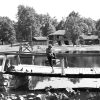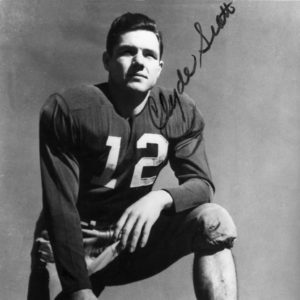calsfoundation@cals.org
Clyde Luther "Smackover" Scott (1924–2018)
Clyde Luther “Smackover” Scott, who received his nickname and his notoriety as a football player from the town he grew up in, became legendary at the University of Arkansas (UA) in Fayetteville (Washington County). An Olympian and a two-sport star for the Razorbacks, he was named the state’s athlete of the century by readers of the Arkansas Democrat-Gazette in 2000. Scott was a three-time Southwest Conference player and an All-American in football in 1948. He also lettered in track and proclaimed himself to be self taught in this sport.
Clyde Scott was born in Dixie, Louisiana, on August 29, 1924, to Luther and Callie Scott. His father was a gang manager for Liberty Oil Company. Clyde was the third of ten children—one of four boys, all with athletic backgrounds. Scott’s family moved to Smackover (Union County) in 1925.
After high school, he was given an appointment at the United States Naval Academy in 1943. Scott went to Bullis Prep in Silver Springs, Maryland, in 1943 in order to qualify for the academy entrance exam. When he went to Annapolis in 1944, he played fullback for the Midshipmen for two years on a team consistently ranked second in the country.
At Annapolis, Scott met Leslie Hampton, who was the current Miss Arkansas. Hampton was visiting Annapolis on her way to the Miss America pageant, and Scott was assigned to be her escort around the campus. Scott resigned his post in July 1946, and he and Hampton were married the next month in Lake Village (Chicot County). He had previously been recruited to play for the UA Razorbacks and so decided to transfer there; some sources report that he left for football practice the day after his wedding. The couple had two children.
Scott went on to have an illustrious career at UA both as a running back and in the defensive backfield. He gained 1,463 yards from 1946 to 1948. Scott earned All-American honors in 1948 after rushing for 670 yards on just ninety-five carries, which produced an astonishing 7.1 yards per carry. Scott’s biggest contributions came on defense. He was known for stopping Louisiana State University (LSU) at the one-yard line in the 1947 Cotton Bowl to preserve a scoreless tie with the favored Tigers.
Scott left the university a year before graduating in 1948, as he was drafted by the Philadelphia Eagles. Coach John Barnhill retired Scott’s number 12 in 1950—a rare event in Razorback history.
When he arrived at UA, Scott wanted to play baseball, but Barnhill would not allow it, saying he could run track instead. Scott was a self-taught sprinter who lettered in track at UA the same years he lettered in football. He set a UA record in the 100-yard dash at 9.4 seconds. He ran 13.7 seconds in the 110-meter high hurdles in the National Collegiate Athletic Association (NCAA) championship, just beating Northwestern University’s Bill Porter. Porter got revenge in the London Olympics in 1948, edging Scott out of the gold medal in a photo finish.
Scott played four seasons in the National Football League (NFL) beginning in 1949, three with the Philadelphia Eagles and one with the Detroit Lions. He was forced to retire in 1953 after a knee injury.
Scott went on to a successful business career, turning down a business venture in Detroit to return to Arkansas. He moved to Little Rock (Pulaski County), where he became the state manager for National Equity. He moved to Springfield, Illinois, in 1957 to become state manager for Franklin Life. Scott was then persuaded to return to Arkansas in 1960 by his Naval Academy friend Jack Stephens, who made him executive vice president of Union Life. Scott made the credit life division one of the most profitable at Union Life. When Stephens sold the company to one of the Hunt brothers, Scott was made president of the company. He retired in 1995. He and his wife lived in Little Rock.
Barnhill once said of Scott, “Clyde Scott meant more to the Arkansas program than any other athlete. His coming to Arkansas convinced other Arkansas boys they should stay home.”
Scott died in Little Rock on January 30, 2018. His brain was donated to Boston University for purposes of researching Chronic Traumatic Encephalopathy (CTE), a condition common to football players.
For additional information:
Allen, Nate. Tales from Hog Heaven: A Collection of the Greatest Arkansas Football Stories Ever Told. Champaign, IL: Sports Publishing LLC, 2002.
Henry, Orville, and Jim Bailey. The Razorbacks: A Story of Arkansas Football. Fayetteville: University of Arkansas Press, 1996.
Lunsford, Scott, and Ben Whetstone. Interview with Clyde Scott. David and Barbara Pryor Center for Arkansas Oral and Visual History. University of Arkansas, Fayetteville, Arkansas. http://pryorcenter.uark.edu/interview.php?thisProject=Arkansas%20Memories&thisProfileURL=SCOTT-Clyde&displayName=Clyde%20Scott&thisInterviewee=451 (accessed September 8, 2022).
Murphy, Tom. “Scott, 93, a Proven Do-It-All Athlete.” Arkansas Democrat-Gazette, January 31, 2018, p. 7C.
Schroeder, George. Hogs! A History: The Story of Razorbacks Football. New York: Simon and Schuster, 2005.
Scott, Steve. “The Price Paid for Playing.” Arkansas Democrat-Gazette, February 23, 2020, p. 2H.
Scott Cashion
University of Arkansas, Fayetteville
 Recreation and Sports
Recreation and Sports Clyde Scott
Clyde Scott 




Comments
No comments on this entry yet.